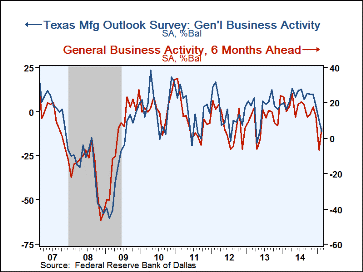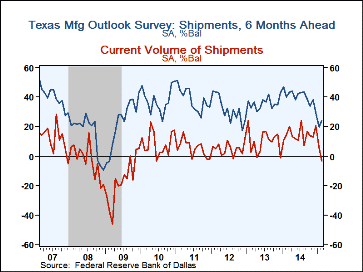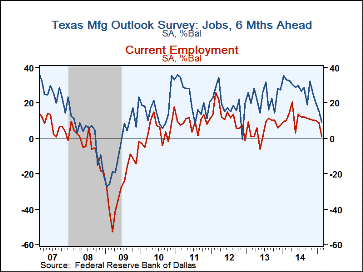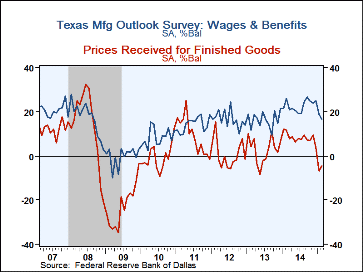 Global| Feb 23 2015
Global| Feb 23 2015Dallas Fed Factory Sector Activity Continues To Ease; Outlook Improves
by:Tom Moeller
|in:Economy in Brief
Summary
The Federal Reserve Bank of Dallas reported that its February Composite index of factory sector activity remained negative at -11.2 following -4.4 in January. It was the first time that two months were successively negative in two [...]
The Federal Reserve Bank of Dallas reported that its February Composite index of factory sector activity remained negative at -11.2 following -4.4 in January. It was the first time that two months were successively negative in two years. The figure reflected weakness amongst all of the component series, most notably the volume of shipments which were at their weakest since June 2010. The company outlook measure fell to its lowest since May 2013 and the production index value held steady at its lowest level since April 2013. Employment also fell to its lowest point since May 2013. Pricing power improved but just slightly. The index reading of prices received for finished goods remained negative at 6.7, up slightly from January but still the second weakest reading since May 2013. Raw materials pricing remained depressed with lower commodity prices.
The business activity reading for six months ahead recovered to 5.5 following a January turn into negative territory. The company outlook figure also moved up a bit m/m but remained depressed versus its high in January of last year. The future production figure also notched up m/m but remained near its weakest reading since the end of the recession. Expected new orders growth slipped to its weakest figure since November 2012. The reading for future employment collapsed to its lowest level since since November 2012. The reading for wages expected in six months improved, however, and recovered its January decline. Workers' hours remained weak. The expected workweek fell to its lowest level since May 2013.
The diffusion indexes are calculated as the percentage of total respondents reporting increases minus the percentage reporting declines. Firms are asked whether output, employment, orders, prices and other indicators increased, decreased or remained unchanged over the previous month. The data can be found in Haver's SURVEYS database.
| Dallas Federal Reserve Manufacturing Survey (SA, Percent Balance) | Feb | Jan | Dec | Feb '14 | 2014 | 2013 | 2012 |
|---|---|---|---|---|---|---|---|
| General Business Activity Versus One Month Ago | -11.2 | -4.4 | 3.5 | 1.4 | 8.3 | 2.2 | -0.6 |
| Production | 0.7 | 0.7 | 16.4 | 11.5 | 14.6 | 9.8 | 8.7 |
| Growth Rate of New Orders | -16.3 | -18.0 | -4.0 | 6.4 | 4.7 | 0.1 | -2.8 |
| Number of Employees | 1.3 | 9.0 | 10.0 | 9.9 | 11.5 | 5.6 | 11.8 |
| Prices Received for Finished Goods | -4.4 | -6.7 | 4.2 | 11.9 | 8.3 | 2.9 | 0.9 |
| Business Activity in Six Months | 5.5 | -6.4 | 13.0 | 15.5 | 17.4 | 11.0 | 7.6 |
| Production | 24.9 | 22.1 | 33.1 | 47.7 | 42.7 | 37.1 | 32.4 |
| Future New Orders Growth Rate | 12.8 | 12.9 | 26.2 | 35.4 | 31.5 | 25.0 | 19.5 |
| Number of Employees | 9.2 | 15.3 | 20.2 | 33.1 | 28.6 | 23.1 | 19.1 |
| Wages & Benefits | 37.2 | 28.2 | 38.0 | 43.1 | 43.0 | 38.2 | 34.2 |
Tom Moeller
AuthorMore in Author Profile »Prior to joining Haver Analytics in 2000, Mr. Moeller worked as the Economist at Chancellor Capital Management from 1985 to 1999. There, he developed comprehensive economic forecasts and interpreted economic data for equity and fixed income portfolio managers. Also at Chancellor, Mr. Moeller worked as an equity analyst and was responsible for researching and rating companies in the economically sensitive automobile and housing industries for investment in Chancellor’s equity portfolio. Prior to joining Chancellor, Mr. Moeller was an Economist at Citibank from 1979 to 1984. He also analyzed pricing behavior in the metals industry for the Council on Wage and Price Stability in Washington, D.C. In 1999, Mr. Moeller received the award for most accurate forecast from the Forecasters' Club of New York. From 1990 to 1992 he was President of the New York Association for Business Economists. Mr. Moeller earned an M.B.A. in Finance from Fordham University, where he graduated in 1987. He holds a Bachelor of Arts in Economics from George Washington University.
More Economy in Brief
 Global| Feb 05 2026
Global| Feb 05 2026Charts of the Week: Balanced Policy, Resilient Data and AI Narratives
by:Andrew Cates










